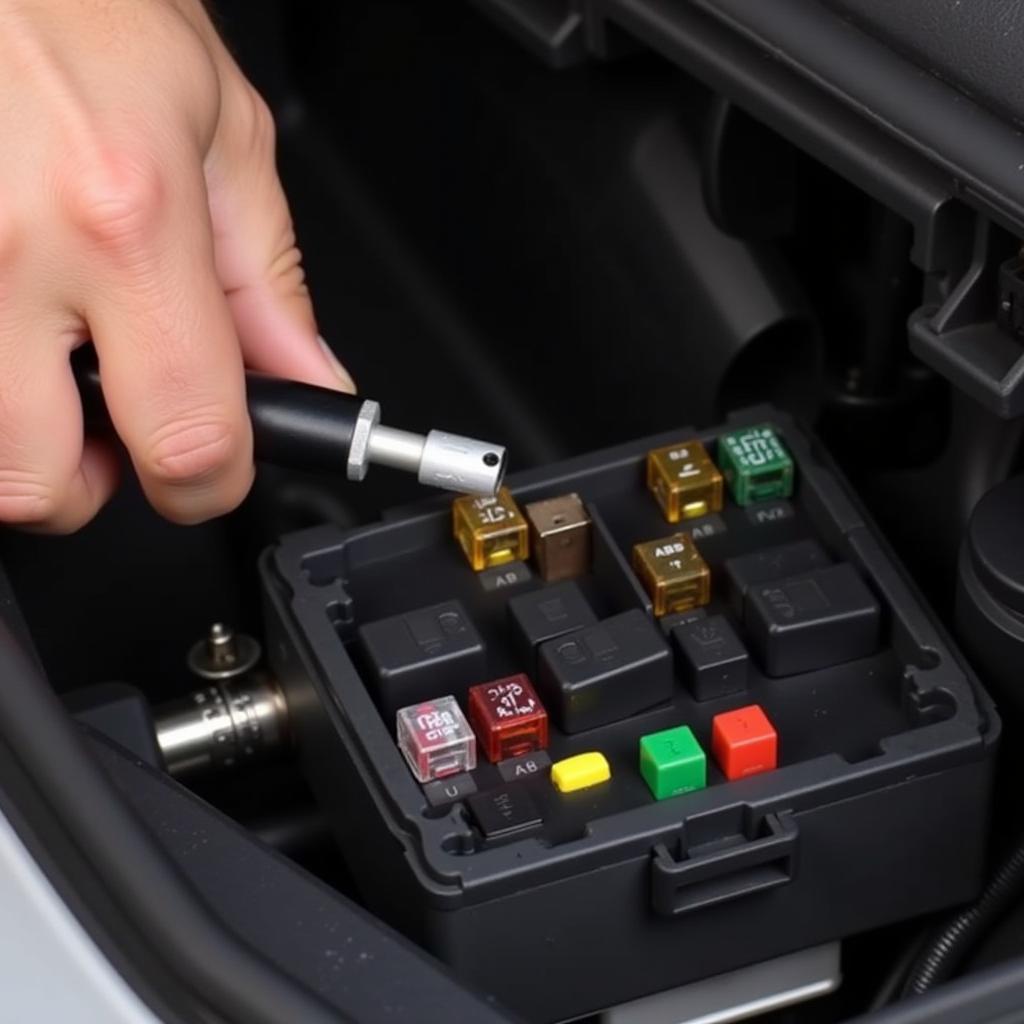That pesky ABS light glaring at you from your dashboard? Don’t panic! Finding out How To Fix Abs Light On Car Without Scanner is a common search, and we’re here to help you understand and potentially fix the issue without needing expensive diagnostic tools. You can often pinpoint the problem and even solve it yourself with a bit of know-how.
While a scanner can provide a precise diagnostic code, there are several checks you can perform at home before heading to a mechanic. This can save you time and potentially a hefty repair bill. Remember safety first! Always work on your car on a level surface with the parking brake engaged.
Common Causes of an Illuminated ABS Light
Several issues can trigger the ABS warning light. Understanding these can guide your troubleshooting process. These range from simple fixes like low brake fluid to more complex issues requiring professional help.
- Low Brake Fluid: This is the most common culprit. Low brake fluid can affect the ABS system’s operation.
- Faulty ABS Wheel Speed Sensor: These sensors monitor the speed of each wheel and are crucial for ABS function.
- Damaged ABS Wiring: Wiring issues can disrupt communication between the ABS components.
- Malfunctioning ABS Module: This is a more serious and costly issue often requiring replacement.
- Blown Fuse: A blown fuse in the ABS system circuit can disable the entire system.
Troubleshooting Your ABS Light without a Scanner
Here’s a step-by-step guide to help you figure out why that ABS light is on:
- Check Your Brake Fluid Level: Open the hood and locate the brake fluid reservoir. Check the fluid level against the minimum and maximum markings. If it’s low, top it off with the correct brake fluid type specified in your owner’s manual.
- Inspect the ABS Wheel Speed Sensors: These sensors are located behind each wheel. Look for any visible damage to the sensor or its wiring. Corrosion, dirt, or debris can interfere with their operation. Carefully clean the sensors with brake cleaner. fixed car sensor will provide more detail about this.
- Examine the ABS Wiring: Trace the wiring from the ABS module to each wheel speed sensor. Look for any signs of damage, such as frayed wires, loose connections, or corrosion.
- Check the ABS Fuse: Locate your car’s fuse box (usually under the dashboard or in the engine bay). Consult your owner’s manual to identify the ABS fuse and check if it’s blown. If so, replace it with a new fuse of the correct amperage.
How to Fix Specific Problems
After you’ve identified a potential problem, here’s some advice on how to proceed:
- Low brake fluid: If the fluid is consistently low, it could indicate a leak in the brake system, which requires immediate professional attention.
- Damaged wiring or sensor: If you find damaged wiring or a faulty sensor, replacement is usually the best solution.
- Blown fuse: If replacing the fuse solves the problem temporarily, but it blows again, there’s likely a short circuit somewhere in the ABS system that needs professional diagnosis.
“A simple visual inspection can often reveal the culprit behind the ABS light,” says John Davis, a seasoned automotive engineer. “Checking fluid levels, wiring, and sensors can save you a trip to the mechanic.”
 Checking the ABS Fuse in a Car’s Fuse Box
Checking the ABS Fuse in a Car’s Fuse Box
How Much Does It Cost to Fix ABS in Car?
The cost to fix an ABS issue can vary greatly depending on the problem. A simple fix like a blown fuse can cost just a few dollars, while replacing an ABS module can cost hundreds or even thousands. how much to fix abs in car will give you more insight on these costs.
What if These Steps Don’t Work?
If you’ve tried these steps and your ABS light is still on, it’s time to seek professional help. A mechanic with a diagnostic scanner can pinpoint the exact issue and recommend the appropriate repair. Don’t delay, as a functioning ABS system is crucial for your safety. fixed diagnostic car offers more information on diagnostic tools.
Conclusion
Learning how to fix ABS light on car without scanner can empower you to address minor issues and potentially save on repair costs. However, always remember that a properly functioning ABS system is critical for safety. If you’re unsure about anything, or the problem persists, seek professional advice. Contact AutoTipPro at +1 (641) 206-8880 or visit our office at 500 N St Mary’s St, San Antonio, TX 78205, United States. big ambitions fix car reveals our passion for car repairs.
“Don’t underestimate the importance of regular maintenance. A simple check of your brake fluid and ABS components can prevent bigger problems down the road,” adds Sarah Miller, a certified automotive technician.
We encourage you to connect with us for further assistance. Don’t let that ABS light keep you in the dark!




Leave a Reply